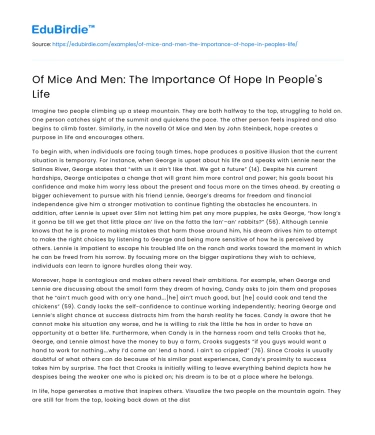Imagine two people climbing up a steep mountain. They are both halfway to the top, struggling to hold on. One person catches sight of the summit and quickens the pace. The other person feels inspired and also begins to climb faster. Similarly, in the novella Of Mice and Men by John Steinbeck, hope creates a purpose in life and encourages others.
To begin with, when individuals are facing tough times, hope produces a positive illusion that the current situation is temporary. For instance, when George is upset about his life and speaks with Lennie near the Salinas River, George states that “with us it ain’t like that. We got a future” (14). Despite his current hardships, George anticipates a change that will grant him more control and power; his goals boost his confidence and make him worry less about the present and focus more on the times ahead. By creating a bigger achievement to pursue with his friend Lennie, George’s dreams for freedom and financial independence give him a stronger motivation to continue fighting the obstacles he encounters. In addition, after Lennie is upset over Slim not letting him pet any more puppies, he asks George, “how long’s it gonna be till we get that little place an’ live on the fatta the lan’–an’ rabbits?” (56). Although Lennie knows that he is prone to making mistakes that harm those around him, his dream drives him to attempt to make the right choices by listening to George and being more sensitive of how he is perceived by others. Lennie is impatient to escape his troubled life on the ranch and works toward the moment in which he can be freed from his sorrow. By focusing more on the bigger aspirations they wish to achieve, individuals can learn to ignore hurdles along their way.
Save your time!
We can take care of your essay
- Proper editing and formatting
- Free revision, title page, and bibliography
- Flexible prices and money-back guarantee
Moreover, hope is contagious and makes others reveal their ambitions. For example, when George and Lennie are discussing about the small farm they dream of having, Candy asks to join them and proposes that he “ain’t much good with on’y one hand….[he] ain’t much good, but [he] could cook and tend the chickens” (59). Candy lacks the self-confidence to continue working independently; hearing George and Lennie’s slight chance at success distracts him from the harsh reality he faces. Candy is aware that he cannot make his situation any worse, and he is willing to risk the little he has in order to have an opportunity at a better life. Furthermore, when Candy is in the harness room and tells Crooks that he, George, and Lennie almost have the money to buy a farm, Crooks suggests “if you guys would want a hand to work for nothing….why I’d come an’ lend a hand. I ain’t so crippled” (76). Since Crooks is usually doubtful of what others can do because of his similar past experiences, Candy’s proximity to success takes him by surprise. The fact that Crooks is initially willing to leave everything behind depicts how he despises being the weaker one who is picked on; his dream is to be at a place where he belongs.
In life, hope generates a motive that inspires others. Visualize the two people on the mountain again. They are still far from the top, looking back down at the distance they have covered. Even if a dream is unattainable, the presence of hope pushes individuals to continue to try and support each other.






 Stuck on your essay?
Stuck on your essay?

